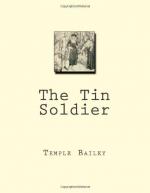Jean went on with her knitting, Hilda did not knit. When she was not helping in the office or in the house, her hands lay idle in her lap.
Jean’s mind, as she worked, was on those long white hands of Hilda’s. Her own hands had short fingers like her father’s. Her mother’s hands had been slender and transparent. Hilda’s hands were not slender, they had breadth as well as length, and the skin was thick. Even the whiteness was like the flesh of a fish, pale and flabby. No, there was no beauty at all in Hilda’s hands.
Once Jean had criticised them to her father. “I think they are ugly.”
“They are useful hands, and they have often helped me.”
“I like Emily’s hands much better.”
“Oh, you and your Emily,” he had teased.
Yet Jean’s words came back to the Doctor the next night, as he sat in the Toy Shop waiting to escort his daughter home.
Miss Emily was serving a customer, a small boy in a red coat and baggy trousers. A nurse stood behind the small boy, and played, as it were, Chorus. She wore a blue cape and a long blue bow on the back of her hat.
The small boy was having the mechanical toys wound up for him. He expressed a preference for the clowns, but didn’t like the colors.
“I want him boo’,” he informed Miss Emily, “he’s for a girl, and she yikes boo’.”
“Blue,” said the nurse austerely, “you know your mother doesn’t like baby talk, Teddy.”
“Ble-yew—” said the small boy, carefully.
“Blue clowns,” Miss Emily stated, sympathetically, “are hard to get. Most of them are red. I have the nicest thing that I haven’t shown you. But it costs a lot—”
“It’s a birfday present,” said the small boy.
“Birthday,” from the Chorus.
“Be-yirthday,” was the amended version, “and I want it nice.”
Miss Emily brought forth from behind the glass doors of a case a small green silk head of lettuce. She set it on the counter, and her fingers found the key, then clickety-click, clickety-click, she wound it up. It played a faint tune, the leaves opened—a rabbit with a wide-frilled collar rose in the center. He turned from side to side, he waggled his ears, and nodded his head, he winked an eye; then he disappeared, the leaves closed, the music stopped.
The small boy was entranced. “It’s boo-ful—”
“Beautiful—” from the background.
“Be-yewtiful—. I’ll take it, please.”
It was while Miss Emily was winding the toy that Dr. McKenzie noticed her bands. They were young hands, quick and delightful hands. They hovered over the toy, caressingly, beat time to the music, rested for a moment on the shoulders of the little boy as he stood finally with upturned face and tied-up parcel.
“I’m coming adain,” he told her.
“Again—.”
“Ag-yain—,” patiently.
“I hope you will.” Miss Emily held out her hand. She did not kiss him. He was a boy, and she knew better.




